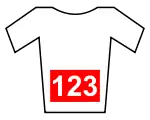Combativity award in the Tour de France
The combativity award is a prize given in the Tour de France for the most combative rider overall during the race. Historically, it favored constant attackers as it was based on the distance spent in a breakaway, included winning checkpoints and outright stage wins. Today, the winner is chosen by a jury.[1] Besides the overall winner, the jury also awards a combativity award to the most aggressive rider at the end of each stage, with this rider allowed to wear a red bib the following race day.
| Combativity award | |
|---|---|
 | |
| Sport | Road bicycle racing |
| Competition | Tour de France |
| Given for | Most aggressive rider |
| Local name | Le Prix de la combativité (French) |
| History | |
| First award | 1952 |
| Editions | 68 known (as of 2020) |
| First winner | |
| Most wins |
|
| Most recent | |
The 1981 Tour de France marked the last time the winner of the general classification also won the combativity award.
History
Since 1952,[2] after every stage the most combative cyclist was given an award, and an overall competition was recorded.[3] At the end of the 1956 Tour de France, André Darrigade was named the most attacking cyclist.[4] At this point, the award was given the same importance as the award for the cyclist with the most bad luck, Picot in 1956.
In 1961, the award was not given to an individual cyclist, but to an entire team, the regional team West-South-West.
The system of the award has changed during the years. Historically, riders accumulated points, and the cyclist with the most points at the end of the Tour was declared winner.[5] The cyclist did not have to finish the race, for example in 1971 Luis Ocaña crashed out while wearing the Yellow Jersey on the Col de Mente in stage 14 and in 1972 Cyrille Guimard was wearing the Green Jersey and in 2nd place overall when he withdrew, but both were still given the combativity award.
In 1979, the combativity award was initially given to Joop Zoetemelk;[6] he was later disqualified and Hennie Kuiper received the award.
In a system that was implemented 2003, a jury of eight specialists in cycling selected the most combative cyclist of each stage (excluding time trials), with the classification for most distance in breakaway groups only part of the decision.[7]
There is no jersey for the most combative rider of the previous stage, but he can be recognized by the race number worn on his back: it consists of a white number on a red background instead of the usual black on white (since 1998).[7][8]
At the end of the Tour de France, a "super-combativity award" is given to the most combative cyclist of the race. As of 2017, the total prize money for the super-combativity award winner is €20,000.[9]
Winners
Overall super-combativity award winners since 1953.[10]
Notes
- In March 2011, Franco Pellizotti's results were removed after the Court of Arbitration for Sport found his biological passport indicated irregular values. The classification standings were not altered.[15]
References
- (PDF) (in French). pp. article 25f, p 13 https://netstorage.lequipe.fr/ASO/cycling_tdf/rules-reglement-tour-de-france-2019.pdf. Retrieved 4 August 2019. Missing or empty
|title=(help) - "Tour de France: An alternative view of the ultimate road race". The Independent. 6 July 2007. Retrieved 20 May 2009.
- "Premies voor Van der Pluym en Stolker". Leeuwarder Courant (in Dutch). 14 July 1956. p. 11. Retrieved 8 May 2009.
- "Klassementen". Leeuwarder Courant (in Dutch). 30 July 1956. p. 5. Retrieved 8 May 2009.
- Eddy van der Mark. "Tour Xtra:Combativity Classification". CvccBike. Retrieved 24 April 2009.
- "Zoetemelk strijdlustigste". Leeuwarder Courant (in Dutch). 23 July 1979. p. 13. Retrieved 8 May 2009.
- "Règlement de l'Épreuve - Article 10: Maillots des leaders" (PDF) (in French). ASO. 17 July 2008. p. 61. Archived from the original (PDF) on 24 August 2009. Retrieved 24 April 2009.
Par ailleurs, le coureur combatif sera identifié par deux dossards spécifiques avec chiffres blancs sur fond rouge.
- Nick Brownlee (23 July 2013). Vive le Tour!: Wiggo, and the Amazing Tales of the Tour de France. Pavilion Books. p. 75. ISBN 978-1-909396-34-0.
- Liste des Prix [Prize money] (PDF). Tour de France. Paris: Amaury Sport Organisation. 2017. p. 19. Archived (PDF) from the original on 18 July 2017. Retrieved 18 July 2017.
- "Le Tour en chiffres" (PDF) (in French). Amaury Sport Organisation. p. 126. Archived from the original (PDF) on 3 October 2009. Retrieved 3 July 2009.
- "Nederlandse ploeg won in totaal f 70.000 aan prijzen en premies". Leeuwarder Courant (in Dutch). 27 July 1953. p. 5. Retrieved 9 May 2009.
- "Bobet onbetwist winnaar van Tour de France". Leeuwarder Courant (in Dutch). 2 August 1954. p. 3. Retrieved 8 May 2009.
- "Bobet onbetwist winnaar van Tour de France". Leeuwarder Courant (in Dutch). 2 August 1954. p. 3. Retrieved 8 May 2009.
- "Klassementen". Leeuwarder Courant (in Dutch). 1 August 1955. p. 3. Retrieved 8 May 2009.
- "Italian cyclist Franco Pellizotti found guilty of doping by Court of Arbitration for Sport". ESPN.com. 9 March 2011. Retrieved 10 July 2012.